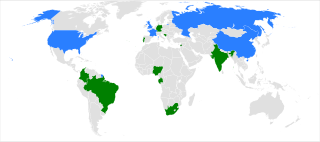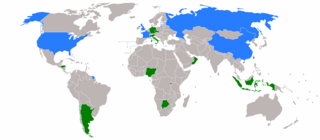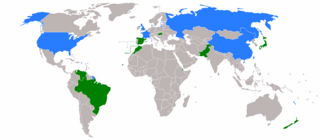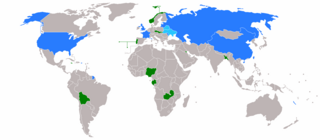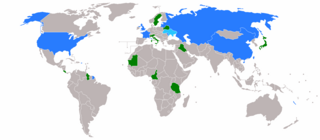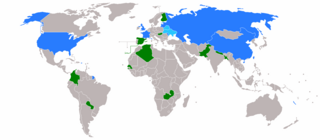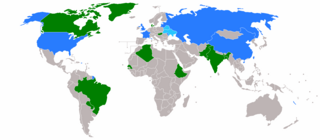| |||
5 (of 10) non-permanent seats on the United Nations Security Council | |||
Security Council after 2008 elections. | |||
| |||
| Unsuccessful candidates |
The 2008 United Nations Security Council election was held on 17 October 2008 during the 63rd session of the United Nations General Assembly, held at United Nations Headquarters in New York City. The elections were held for five non-permanent seats on the UN Security Council for two-year mandates commencing on 1 January 2009. [1]

The United Nations (UN) is an intergovernmental organization that was tasked to maintain international peace and security, develop friendly relations among nations, achieve international co-operation and be a centre for harmonizing the actions of nations. The headquarters of the UN is in Manhattan, New York City, and is subject to extraterritoriality. Further main offices are situated in Geneva, Nairobi, and Vienna. The organization is financed by assessed and voluntary contributions from its member states. Its objectives include maintaining international peace and security, protecting human rights, delivering humanitarian aid, promoting sustainable development and upholding international law. The UN is the largest, most familiar, most internationally represented and most powerful intergovernmental organization in the world. In 24 October 1945, at the end of World War II, the organization was established with the aim of preventing future wars. At its founding, the UN had 51 member states; there are now 193. The UN is the successor of the ineffective League of Nations.

The United Nations General Assembly is one of the six principal organs of the United Nations (UN), the only one in which all member nations have equal representation, and the main deliberative, policy-making, and representative organ of the UN. Its powers are to oversee the budget of the UN, appoint the non-permanent members to the Security Council, appoint the Secretary-General of the United Nations, receive reports from other parts of the UN, and make recommendations in the form of General Assembly Resolutions. It has also established numerous subsidiary organs.

The City of New York, usually called either New York City (NYC) or simply New York (NY), is the most populous city in the United States and in the U.S. state of New York. With an estimated 2017 population of 8,622,698 distributed over a land area of about 302.6 square miles (784 km2), New York is also the most densely populated major city in the United States. Located at the southern tip of the state of New York, the city is the center of the New York metropolitan area, the largest metropolitan area in the world by urban landmass and one of the world's most populous megacities, with an estimated 20,320,876 people in its 2017 Metropolitan Statistical Area and 23,876,155 residents in its Combined Statistical Area. A global power city, New York City has been described as the cultural, financial, and media capital of the world, and exerts a significant impact upon commerce, entertainment, research, technology, education, politics, tourism, art, fashion, and sports. The city's fast pace has inspired the term New York minute. Home to the headquarters of the United Nations, New York is an important center for international diplomacy.
In accordance with the Security Council's rotation rules, the ten non-permanent Security Council seats rotate among the regional blocs into which UN member states traditionally divide themselves for voting and representation purposes. All five contests were won on the first ballot. The five available seats were allocated as follows:

The United Nations Regional Groups are the geopolitical regional groups of the Member States of the United Nations. Originally, United Nations Member States were unofficially grouped into five geopolitical regional groups. However, what began as an informal means of sharing the distribution of posts for United Nations bodies quickly took on a much more expansive role. Depending on the context, the regional groups control elections to United Nations-related positions, on the basis of geographic representation, as well as coordinate substantive policy, and form common fronts for negotiations and voting.
- One for Africa, held by South Africa
- One for Asia, held by Indonesia.
- One for Latin America and the Caribbean, held by Panama.
- Two for the Western European and Others Group, held by Belgium and Italy.

The following is an alphabetical list of subregions in the United Nations geoscheme for Africa, used by the UN and maintained by the UNSD department for statistical purposes.

South Africa, officially the Republic of South Africa (RSA), is the southernmost country in Africa. It is bounded to the south by 2,798 kilometres (1,739 mi) of coastline of Southern Africa stretching along the South Atlantic and Indian Oceans; to the north by the neighbouring countries of Namibia, Botswana, and Zimbabwe; and to the east and northeast by Mozambique and Eswatini (Swaziland); and it surrounds the enclaved country of Lesotho. South Africa is the largest country in Southern Africa and the 25th-largest country in the world by land area and, with over 57 million people, is the world's 24th-most populous nation. It is the southernmost country on the mainland of the Old World or the Eastern Hemisphere. About 80 percent of South Africans are of Sub-Saharan African ancestry, divided among a variety of ethnic groups speaking different African languages, nine of which have official status. The remaining population consists of Africa's largest communities of European (White), Asian (Indian), and multiracial (Coloured) ancestry.

The following is an alphabetical list of subregions in the United Nations geoscheme for Asia, used by the UN and maintained by the UNSD department for statistical purposes.
The newly elected five member states served on the Security Council for the 2009–10 period.





